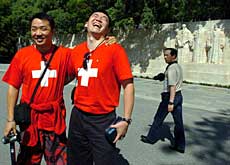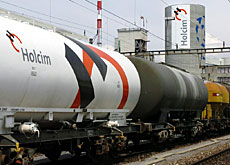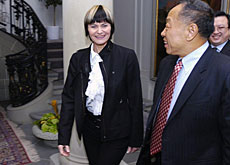Chinese students face visa restrictions

Justice Minister Christoph Blocher says there are indications that a massive increase in visa requests from China is driven by illegal immigration.
The Swiss authorities have imposed restrictions on student visas for Chinese nationals, fearing some applicants may be trying to abuse the system.
“We decided in December to centralise applications here at the Federal Migration Office,” spokesman Dominique Boillat told swissinfo.
Previously it was the responsibility of the 26 cantonal authorities to process student visa applications from China.
“We noticed in 2005 a certain level of abuse which began to appear obvious. First of all we had a significant increase in the number of applications for [canton] Valais, which was surprising,” Boillat explained.
Countries like France and Italy also warned the Swiss that young Chinese were using Switzerland as a transit point to enter Europe illegally.
The vast majority of young Chinese who enter the country as students complete their courses and return home. But nearly 100 of the 1,116 Chinese who were granted such visas in 2005 disappeared.
Potential abuses
The office decided to act and asked the cantons to hand over the processing of these applications. “Legally, we can limit the number of permits granted in particular cases when it is confirmed that possible or potential abuses are taking place,” Boillat said.
The Chinese are not the only nationality whose student visa applications are handled centrally and subject to extra scrutiny. Several African nations are also in this category along with a number of developing countries around the world.
The Chinese Embassy in Bern declined to comment on Switzerland’s visa policy, when contacted by swissinfo.
Boillat was not concerned that the clampdown on student visas would send a negative signal to the Chinese, “These things can always be explained and we have no indication that this will create problems for Swiss-Chinese relations.”
Switzerland does not intend to be much more restrictive to the Chinese, he added. “We had to block a certain number of applications because we established that they were most likely abusive but that doesn’t mean that we won’t give out any more visas.
“In 2006 we will continue to grant student visas, we won’t cut it back to zero, we will just look twice before giving out this type of authorisation.”
No phoney schools
In his answer to parliament earlier this week, Blocher referred to cases in Britain where thousands of visas were granted to students through phantom schools, which did not really exist.
Boillat said that this was not a problem in Switzerland. “Rather we had a few schools that did not take the necessary verification work seriously enough.”
However, the centre-left Social Democrat Jean-Noël Rey, who raised the issue in parliament, expressed concern that many Chinese had been denied the opportunity to attend quality tertiary education institutions in Valais.
Switzerland’s profile is soon to be raised considerably in China, with the screening of a 30-part series about Switzerland on Chinese state television from April to December next year.
Economic and tourism ties with China are highly valued and there are regular high-level diplomatic visits between the two countries.
Switzerland was one of the first western countries to establish official relations with China in 1950.
Swiss Economics Minister Joseph Deiss, who was in China last July, described ties between China and Switzerland as a “win-win relationship”.
Chinese tourists, who no longer need a visa to come to Switzerland, are growing in importance to Swiss tourism with twice as many overnight stays by Chinese last year compared with 2004.
Chinese residents in Switzerland: 7,264 (2004)
Number of Chinese in asylum system (including Tibetans): 578 (2005)
Student permits issued: 1,116 (2005)

In compliance with the JTI standards
More: SWI swissinfo.ch certified by the Journalism Trust Initiative




You can find an overview of ongoing debates with our journalists here . Please join us!
If you want to start a conversation about a topic raised in this article or want to report factual errors, email us at english@swissinfo.ch.